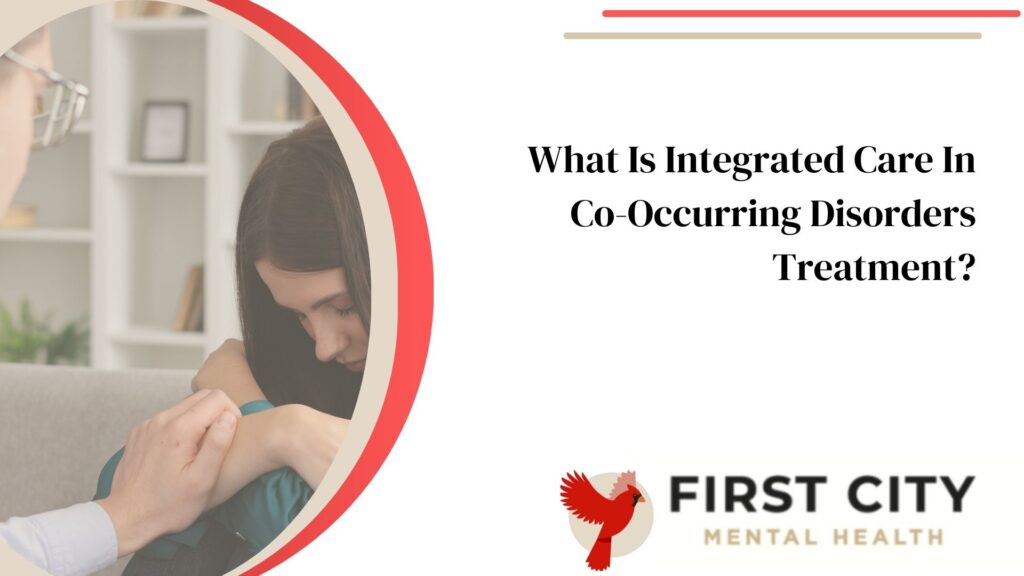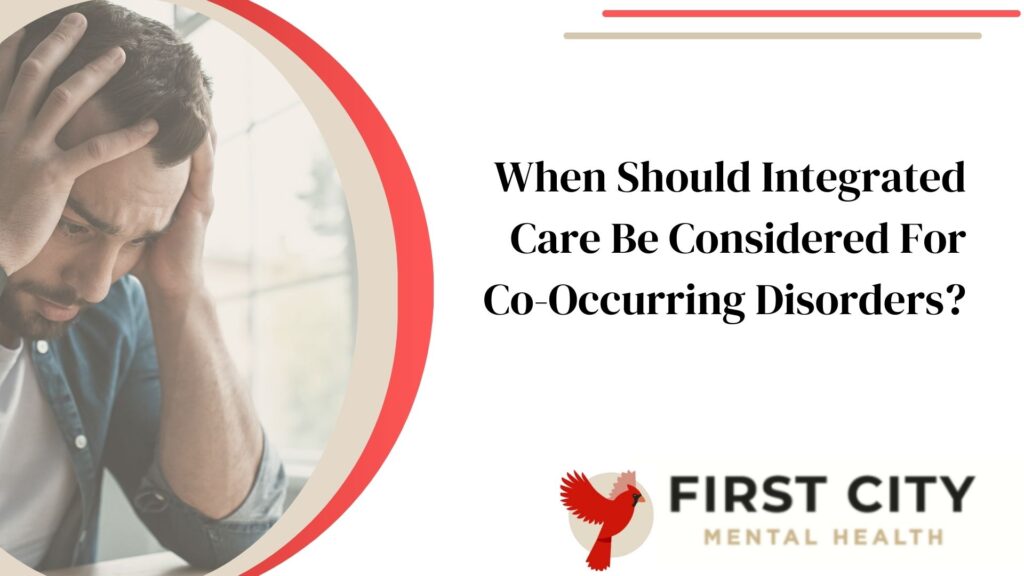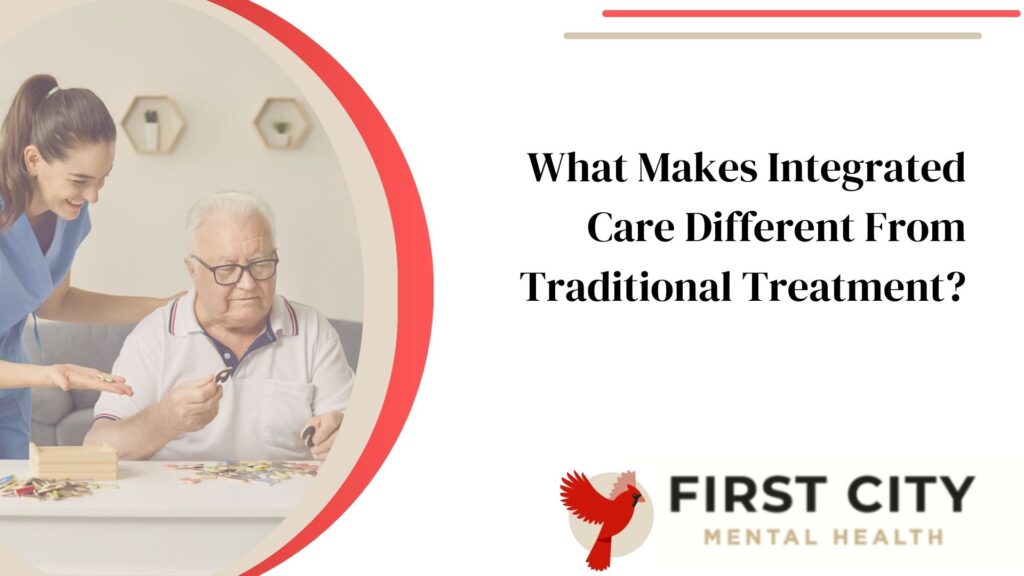
What Contributes to the Effectiveness of Anxiety Disorder Treatment?
January 20, 2025
Why Early Intervention In Co-Occurring Disorders Treatment Matters?
January 21, 2025Struggling with both a mental health issue and substance use can feel overwhelming. Co-occurring disorders, or dual diagnosis, often require longer co-occurring disorders treatment periods and bring more severe challenges.
Integrated care is essential for co-occurring disorders treatment. It provides comprehensive help by targeting both mental health and substance use issues together.
In this blog post, you’ll learn why integrated care matters, when to consider it, and where it’s most effective. Understand how coordinated efforts lead to better long-term recovery outcomes.
Read on to explore the benefits of integrated care.
Key Takeaways
- Treats Together: Integrated care treats mental health disorders and substance use issues at the same time. This helps break harmful cycles and improves well-being.
- Customized Plans: It offers personalized treatment plans, including therapy, medication, and support groups. These plans meet each person’s unique needs.
- Better Outcomes: Coordination between professionals leads to better long-term recovery outcomes. It reduces the risk of relapse with full support for all needs.
- Effective Programs: Integrated care works best for complex conditions like anxiety, PTSD, or bipolar disorder. It combines different therapies for comprehensive help.
- Holistic Approach: The approach includes alternative therapies like yoga or art therapy. This meets complex needs through holistic treatment strategies.
Understanding Co-Occurring Disorders
Co-occurring disorders, also known as dual diagnosis, refer to the simultaneous presence of two or more disorders or illnesses in an individual. This term often describes the combination of a substance use disorder and another psychiatric illness. For instance, someone might struggle with both drug abuse and a mental health condition like depression or anxiety. Addressing these co-occurring disorders is crucial because the presence of one can exacerbate the symptoms of the other, making treatment more complex and challenging.
Prevalence and Statistics
Co-occurring disorders are more common than you might think. According to the Substance Abuse and Mental Health Services Administration (SAMHSA), in 2019, approximately 9.5 million adults in the United States had co-occurring mental health and substance use disorders. This represents about 3.8% of the adult population. These statistics highlight the widespread nature of co-occurring disorders and the need for effective treatment strategies.
Certain groups are more likely to experience co-occurring disorders, including young adults aged 18-25, individuals with a family history of mental health or substance use disorders, those who have experienced trauma or significant stress, and people with a history of mental health treatment or substance abuse. Understanding these demographics can help in identifying and providing targeted mental health services to those in need.
Symptoms and Signs of Co-Occurring Disorders
The symptoms and signs of co-occurring disorders can vary widely depending on the specific disorders present. However, some common signs include changes in mood or behavior, increased anxiety or depression, difficulty sleeping or concentrating, and increased substance use or abuse. Withdrawal symptoms when attempting to stop using substances, hallucinations or delusions, and suicidal thoughts or behaviors are also significant indicators.
It’s essential to note that co-occurring disorders can interact with each other, influencing the course and prognosis of both conditions. For example, someone with a substance use disorder and depression may experience worsened symptoms of depression when using substances. Recognizing these symptoms early can lead to more effective co-occurring disorders treatment.
What Is Integrated Care In Co-Occurring Disorders Treatment?

Integrated care treats both co-occurring mental disorders and substance use disorders at the same time. It combines psychotherapy, medication management, and lifestyle changes. This approach addresses all conditions together for better symptom control.
People with co-occurring disorders treatment in Kokomo, Indiana, face more severe challenges than those with a single disorder. Effective integrated care may also include art therapy, yoga, or meditation. It provides holistic and person-centered treatment plans that meet complex needs.
Assessment and Diagnosis
Assessing and diagnosing co-occurring disorders can be complex, as the symptoms of one disorder can mask or mimic the symptoms of another. A comprehensive assessment by a qualified mental health professional is necessary to accurately diagnose co-occurring disorders. This process typically involves a thorough medical and mental health history, a physical examination, laboratory tests such as blood work and urinalysis, psychological evaluations through questionnaires and interviews, and observation of behavior and symptoms.
A diagnosis of co-occurring disorders is typically made using the Diagnostic and Statistical Manual of Mental Disorders, 5th Edition (DSM-5). The DSM-5 provides standardized criteria for diagnosing mental health and substance use disorders. Once a diagnosis is made, a treatment plan can be developed to address both disorders simultaneously. Integrated treatment, which combines mental health and substance abuse treatment, is often the most effective approach for co-occurring disorders, ensuring comprehensive care and better long-term outcomes.
Why Does Treating Both Mental Health And Substance Use Together Matter?
Mental health conditions and substance use disorders often occur together. Over 25% of adults with severe mental health issues also experience co-occurring disorders. Treating them at the same time is essential. Substance abuse can make mental health problems worse, creating a harmful cycle.
Addressing both issues simultaneously stops this cycle and improves overall well-being.
Integrated co occurring disorders treatment is also more effective in the long run. Longer treatment durations are usually needed due to the complexity of these conditions. Customized plans help manage individual needs better, ensuring no one-size-fits-all approach.
Proper care leads to an improved quality of life for people facing co-occurring disorders.
When Should Integrated Care Be Considered For Co-Occurring Disorders?

Integrated treatment for co-occurring disorders care should be considered for co-occurring disorders when a person shows both mental health disorder and substance abuse symptoms. Screening for both conditions is crucial due to overlapping symptoms, and it helps create a customized treatment plan that addresses these two aspects together.
Collaboration between mental health and substance use professionals is essential for better outcomes.
“Integrated care provides a holistic approach for the complex needs of individuals with dual diagnoses.”
Individuals in significant distress or with impaired functioning need integrated care to manage their conditions effectively. This can include medication, therapy, support groups, and alternative therapies.
Integrated programs offer comprehensive solutions not found in traditional treatments.
Where Are Integrated Care Programs Most Effective?
Integrated care programs are most effective in treating co-occurring disorders by addressing both mental health and substance use issues simultaneously. Recognizing and addressing mental illness symptoms, such as those associated with anxiety, bipolar disorder, PTSD, schizophrenia, and personality disorders, is crucial for individuals seeking treatment for substance use disorders.
Effective programs offer customized psychotherapy, medication, and support groups. These services help manage complex symptoms. The collaborative nature of these treatments for co-occurring disorders leads to better outcomes for people with both mental health and substance use disorders.
How Does Integrated Care Improve Long-Term Recovery Outcomes?
Integrated care combines mental health and substance use co-occurring disorders treatment centers. This approach improves recovery outcomes for co-occurring disorders. It offers comprehensive care customized for each person.
Environmental factors such as family history, trauma, and stress can play a significant role in influencing an individual’s mental health and substance use issues.
Treatment might include medication, therapy, or self-care practices. Addressing both mental health and substance use simultaneously leads to more effective treatment.
Health professionals collaborate closely in integrated care programs. They enhance coordination and support for patients. This method aims to improve overall well-being and lower relapse risks.
Integrated care helps individuals build resilience and coping skills needed for long-term recovery. Co-occurring disorders treatment centers often use this approach because it works best for treating complex conditions like these.
Why Is Coordination Between Providers Key In Integrated Treatment?
Coordination between providers ensures cohesive care. This addresses both mental health and substance use disorders effectively. To treat co occurring disorders, adult co-occurring disorders treatment approaches are essential as they address both conditions simultaneously. This combined method is more effective than treating each disorder separately, as it allows for a holistic understanding of the patient’s needs and circumstances, thereby enhancing recovery outcomes. It prevents fragmented or conflicting treatment plans from different sources, improving overall outcomes.
Effective communication and information sharing are essential for success in co-occurring disorders treatment programs.
Collaboration allows for personalized treatment plans. Individual needs get the attention they deserve when all providers work together. Integrated care also involves community resources to boost recovery efforts significantly.
How Does Integrated Care Reduce The Risk Of Relapse?
Integrated care treats both mental health and substance use disorders at the same time. This reduces the risk of relapse because patients get full support for all their needs. Comprehensive plans include medication and therapy customized for each person.
Collaboration between various professionals also helps in adult co-occurring disorders treatment. They address underlying factors like trauma and stressors that lead to relapse. Support groups and alternative therapies complement the main treatments, promoting overall health.
Longer treatment for co occurring disorders periods are essential for managing these complex conditions effectively.
What Makes Integrated Care Different From Traditional Treatment?

Leading to fewer relapses, integrated care offers a unique approach. This method combines mental health and substance use treatment into one plan. Traditional treatment keeps these treatments separate.
Integrated care uses teamwork among doctors, therapists, and other professionals. They create personalized plans for each person with co-occurring disorders. This reduces gaps in the treatment of co-occurring disorders.
Treatment of co-occurring disorders focuses on both issues at the same time because they are linked. Integrated care also uses evidence-based practices, making it more effective than traditional methods used in places like Kokomo, Indiana.
Final Thoughts
Integrated care is vital for co-occurring disorders treatment program. It helps address both mental health and substance use at the same time. This approach gives patients a better chance of long-term recovery.
Coordinated care reduces the risk of relapse as it offers complete support. Choose integrated care to improve your overall well-being and stability in life.
FAQs
What is integrated care for co-occurring disorders treatment?
Integrated care combines mental health and substance use treatments into one plan. This approach addresses both issues together, improving outcomes.
Why is integrated care crucial for treating co-occurring disorders in Kokomo, Indiana?
In Kokomo, Indiana, many patients have both mental health and substance use problems. Integrated care ensures they get comprehensive help tailored to their needs.
How does integrated treatment improve recovery for co-occurring disorders?
Integrated treatment provides a holistic approach that considers all aspects of a patient’s life, leading to better long-term recovery rates.
Can separate treatments be effective for co occurring disorders?
Separate treatments often miss the interconnected nature of these conditions. Integrated care offers a synchronized method that tackles both issues at once more effectively than isolated approaches.






